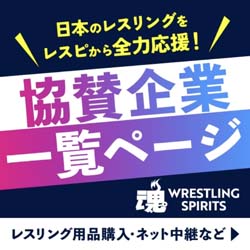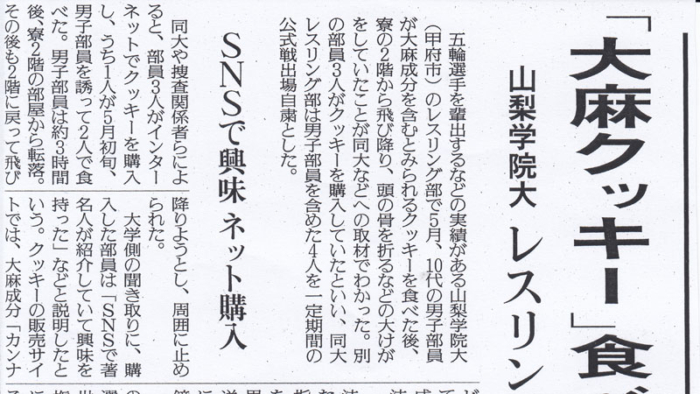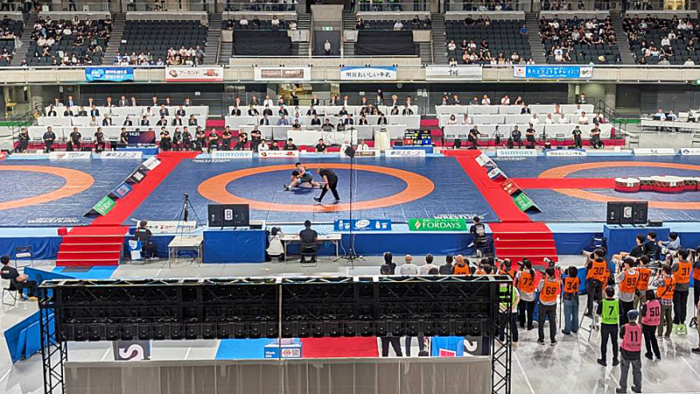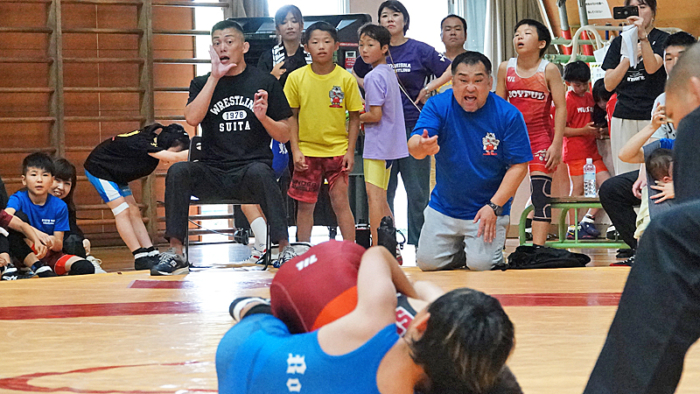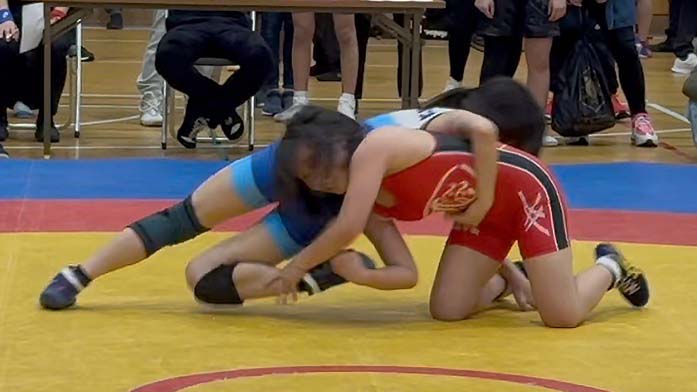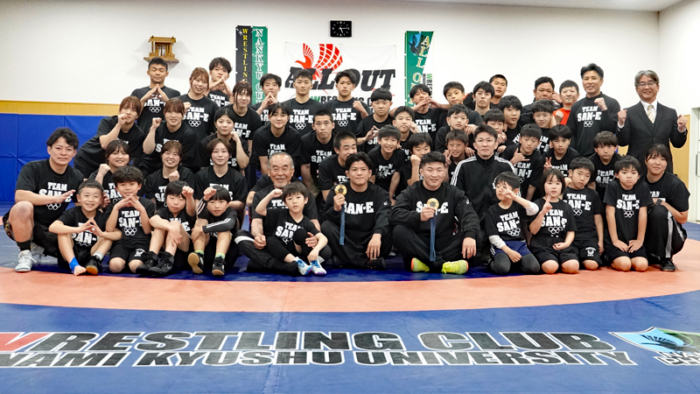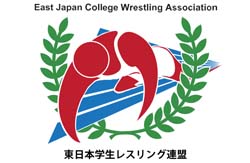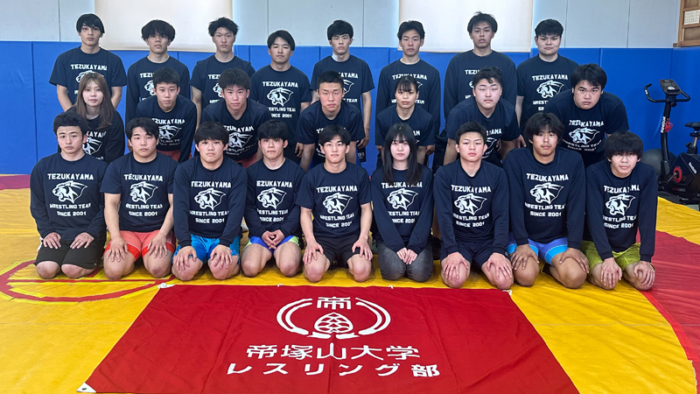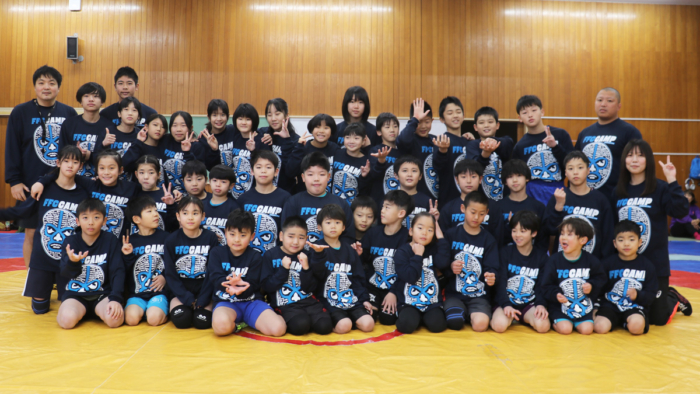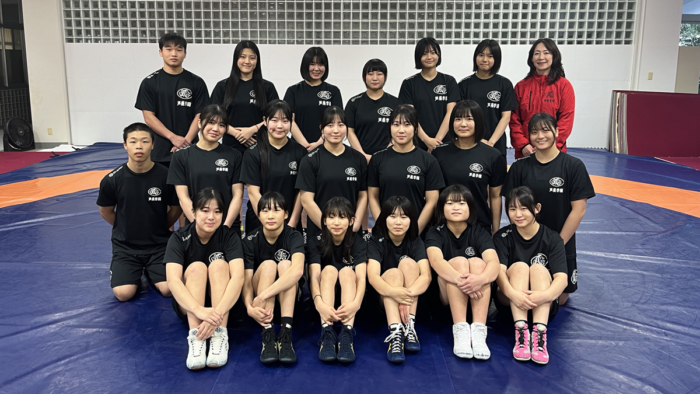Japan Wrestling Federation News ― August 2024 (Paris Olympics/World U17)
※本記事は日本レスリング協会に掲載されていたものです。
Japan captures unprecedented 8 wrestling golds at Paris Olympics
In the wrestling competition at the Paris Olympics held Aug. 5-11, Japan won eight gold medals, one silver and two bronzes across the three styles.
Of those numbers, two golds were won in Greco-Roman, four golds and two bronzes in women’s wrestling, and two golds and a silver in freestyle. What makes the result more eye-opening was that Japan had a total of 13 entries, and came away with 11 medals.
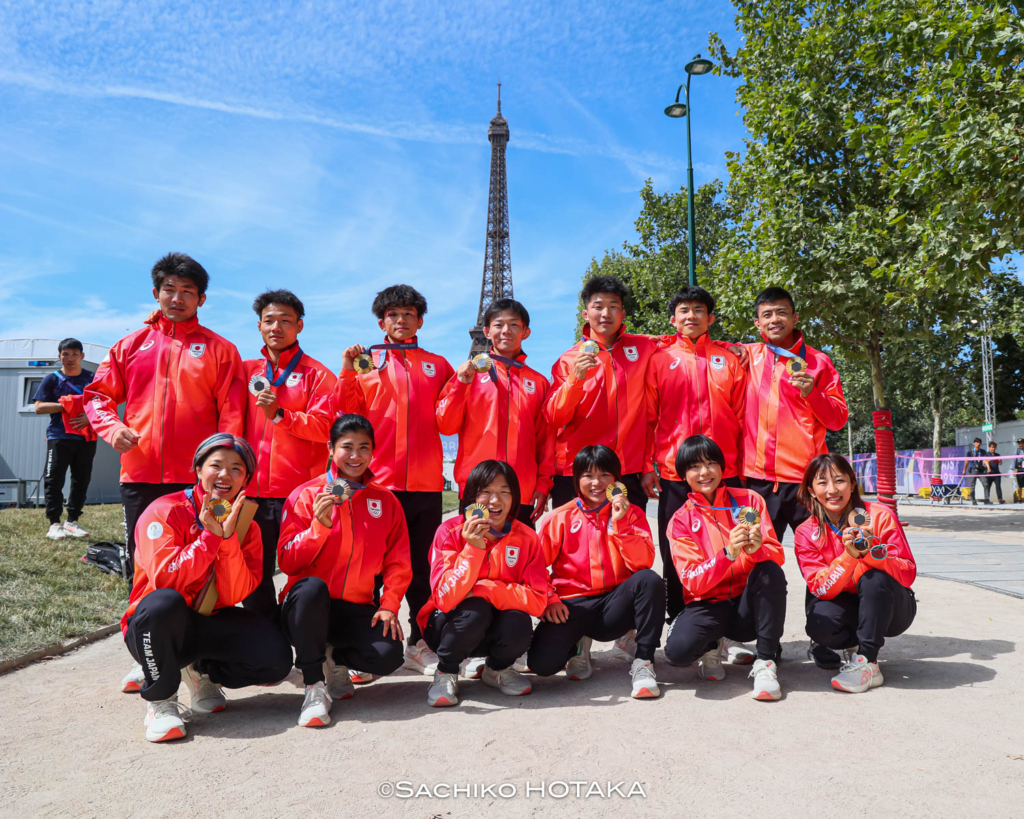
The Japan wrestling team in Paris, which won a record eight gold medals and 11 medals overall. (photo by Sachiko HOTAKA)
The eight gold medals was the most-ever won by Japan at an Olympics, exceeding the five won at both the 1964 and 2021 Tokyo Olympics. It also was far more than any other country, as the United States, Bulgaria and Iran had the next most with two each.
In Paris, Japan won a total of 20 gold medals in all sports, and the eight won in wrestling was the most. It was the third time that wrestlers secured the most golds, after the 1988 Seoul Olympics (4 total, 2 in wrestling) and the 2012 London Olympics (7 total, 4 in wrestling).
Fumita, Kusaka grab Greco golds
In Greco-Roman, Kenichiro FUMITA, still stinging from having to settle for a silver medal three years ago at the Tokyo Olympics, fulfilled his dream by taking the 60kg gold.
In the semifinals, Fumita avenged a loss in the final at last year’s World Championships to Zholaman SHARSHENBEKOV (KGZ) , defeating the two-time reigning world champion 4-3 with a spectacular 4-point throw. He then defeated Liguo CAO (CHN) 4-1 in the final for the gold.
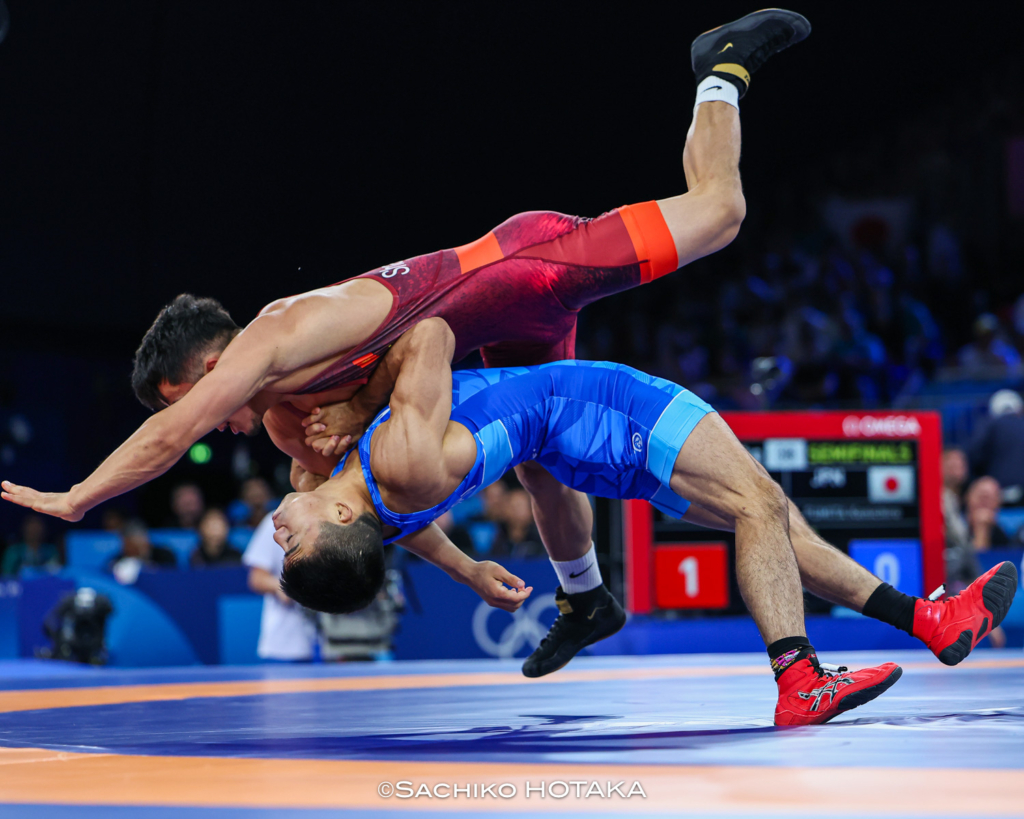
Kenichiro FUMITA (in blue) hits a 4-point throw in his semifinal victory over reigning world champion Zholaman SHARSHENBEKOV (KGZ) at Greco 60kg. (photo by Sachiko HOTAKA)
Kusaka, the top seed at 77kg, earned a place in the gold-medal match by defeating Malkhas AMOYAN (ARM), an opponent he had never beaten before. The world bronze medalist then won the gold with a 5-2 win over Demeu ZHADRAYEV (KAZ), who had beaten two-time reigning world champion Akzhol MAKHMUDOV (KGZ) in the other semifinal.
The Greco golds were the first for Japan since 1984, when Atsuji MIYAHARA won the 52kg title at the Los Angeles Olympics. It was the first time Japan had two Olympic champions in Greco since the 1964 Tokyo Olympics.
Kusaka became the heaviest Olympic wrestling champion in Japanese history. Prior to his victory at 77kg, the heaviest in Greco was Munemura MUNEJI, who won at 70kg at the 1968 Mexico City Olympics. The heaviest overall had been Jiichiro DATE, the freestyle 74kg gold medalist at the 1976 Montreal Olympics.
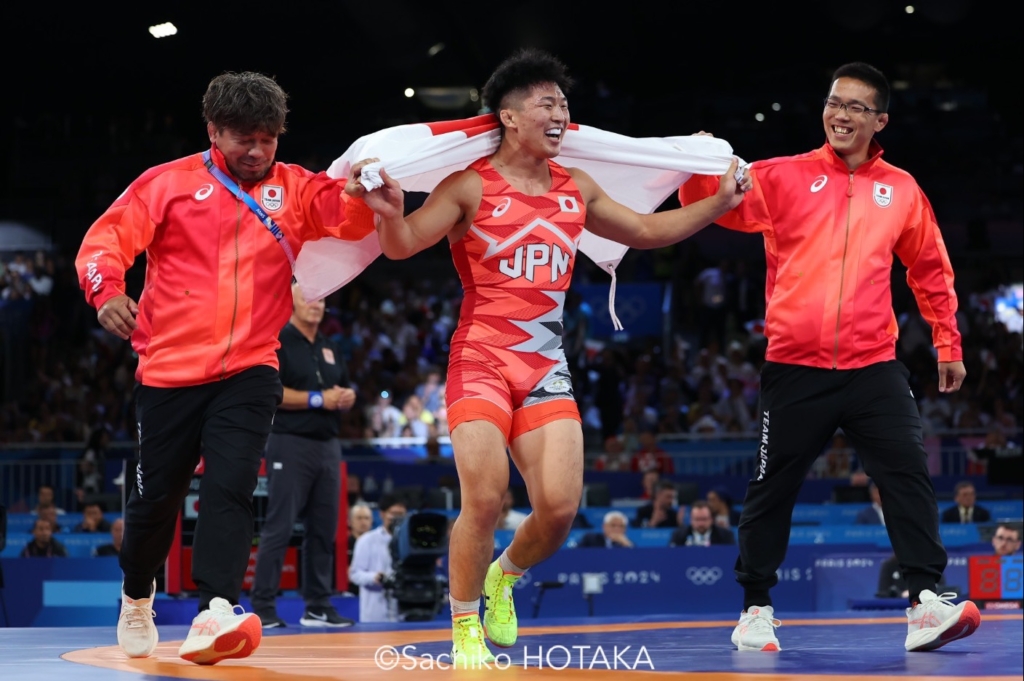
Nao KUSAKA celebrates becoming the heaviest Olympic champion in Japan wrestling history with a victory at Greco 77kg. (photo by Sachiko HOTAKA)
Women dominate with 4 of 6 golds, 2 bronzes
As in all Olympics since women’s wrestling was added to the program, Japan dominated, winning four gold medal and two bronzes in the six weight classes.
Reigning world champions Akari FUJINAMI at 53kg, Tsugumi SAKURAI at 57kg and Yuka KAGAMI at 76kg all won golds in their Olympic debuts, as did Sakura MOTOKI at 62kg.
Fujinami won the gold with a 10-0 victory in the final over Lucia GUZMAN (ECU), one of the few opponents in recent years to have given the Nippon Sport Science University star trouble in a match.
In the quarterfinals at last year’s World Championships, Guzman stunned Fujinami by jumping out to a 5-0 lead, only to see Fujinami come back to win by fall after building a 16-7 lead. She made no mistake in the Paris final.
The victory made Fujinami, at 20 years 3 months 28 days, the second-youngest Olympic wrestling champion in Japan history for both men and women. Kaori ICHO — notably one of Fujinami’s coaches at NSSU — was 20 years 2 months 10 days when she won the first of her four Olympic golds at the 2004 Athens Games.
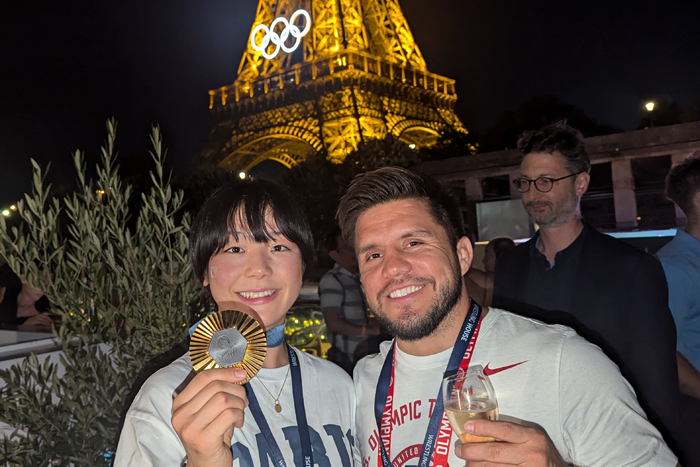
Women’s 53kg gold medalist Akari FUJINAMI poses with 2008 Olympic champion and current UFC star Henry CEJUDO (USA) at an event near the Eiffel Tower.`(Photo by Ikuo HIGUCHI)
Sakurai’s path to the 57kg gold included a 10-4 victory in the semifinals over Rio 2016 champion Helen MAROULIS (USA), a repeat of her win at the same stage at the World Championships. The Paris final was also a rematch, with Sakurai defeating Anastasia NICHITA (MDA) again, this time by a 6-0 score.
Sakurai won her first world title at 55kg in 2021, then moved up to the Olympic weight and won back-to-back golds at 57kg in 2022 and 2023. Add in the Paris result, and it makes Sakurai the fifth Japanese wrestler with four straight global golds.
Previously, Saori YOSHIDA won 16 consecutive global titles, while Icho achieved seven straight twice, Eri TOSAKA won four straight and Risako KAWAI captured five in a row.
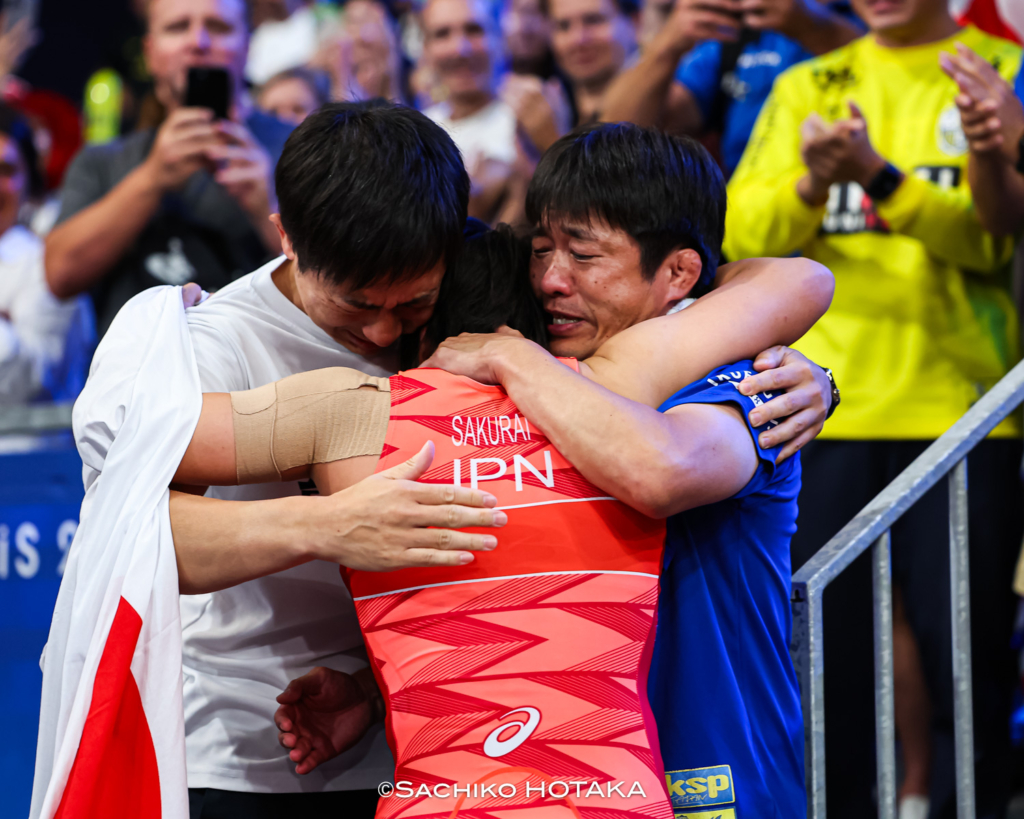
Tsugumi SAKURAI has an emotional moment with Ikuei University coach Yoshimaro YANAGAWA, left, and father Masashi after winnning the women’s 57kg gold. (photo by Sachiko HOTAKA)
Kagami had won the world 76kg gold in the absence of injured 2017 and 2022 champion Yasemin ADAR (TUR), but she showed she earned the title by defeating Adar 3-0 in the quarterfinals in Paris.
When Kagami walked off the mat a 3-1 winner in the final over Kennedy BLADES (USA), it made her the first-ever Japanese Olympic champion in the heaviest weight class for either men or women.
It also made Kagami the sixth wrestler to achieve the combination of an Olympic gold and the world titles on three age-group levels. She was the world cadet (U17) champion in 2017 and 2018, the world junior (U20) champion in 2019 and added the senior gold last year.
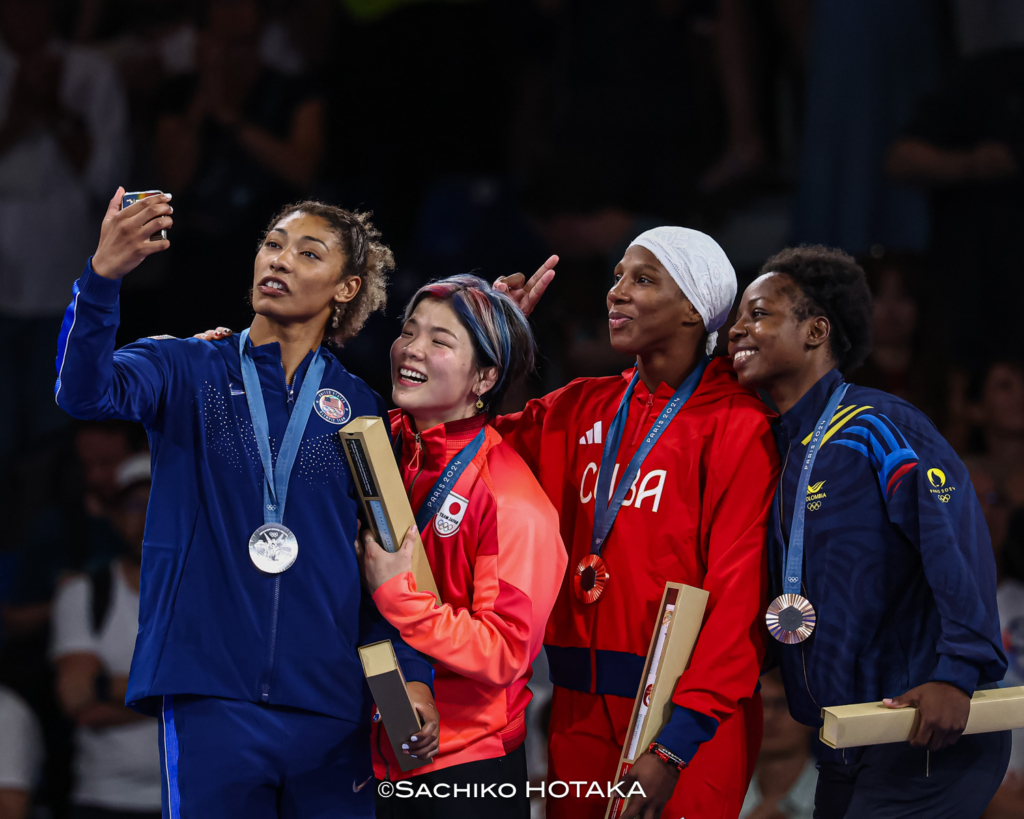
Women’s 76kg champion Yuka KAGAMI, 2nd from left, poses for a commemorative selfie with her fellow medalists on the podium, (photo by Sachiko HOTAKA)
Motoki, the world silver medalist last year, took home the 62kg gold, but not before surviving a scare in the semifinals, turning a precarious situation into one of the most memorable moments of the Olympic tournament.
Motoki was trailing 7-2 against European champion Grace BULLEN (NOR) and was in the process of being tripped backward when she suddenly locked her opponent’s arms, dropped back into a bridge and flipped Bullen over onto her back to secure a dramatic fall.
In the final, she rolled to a 12-1 victory over Iryna KOLIADENKO (UKR), who had upset world champion and Motoki nemesis Aisuluu TYNYBEKOVA (KGZ) in the semifinals. The gold capped her progress from a world bronze at 59kg in 2022 and world silver last year.
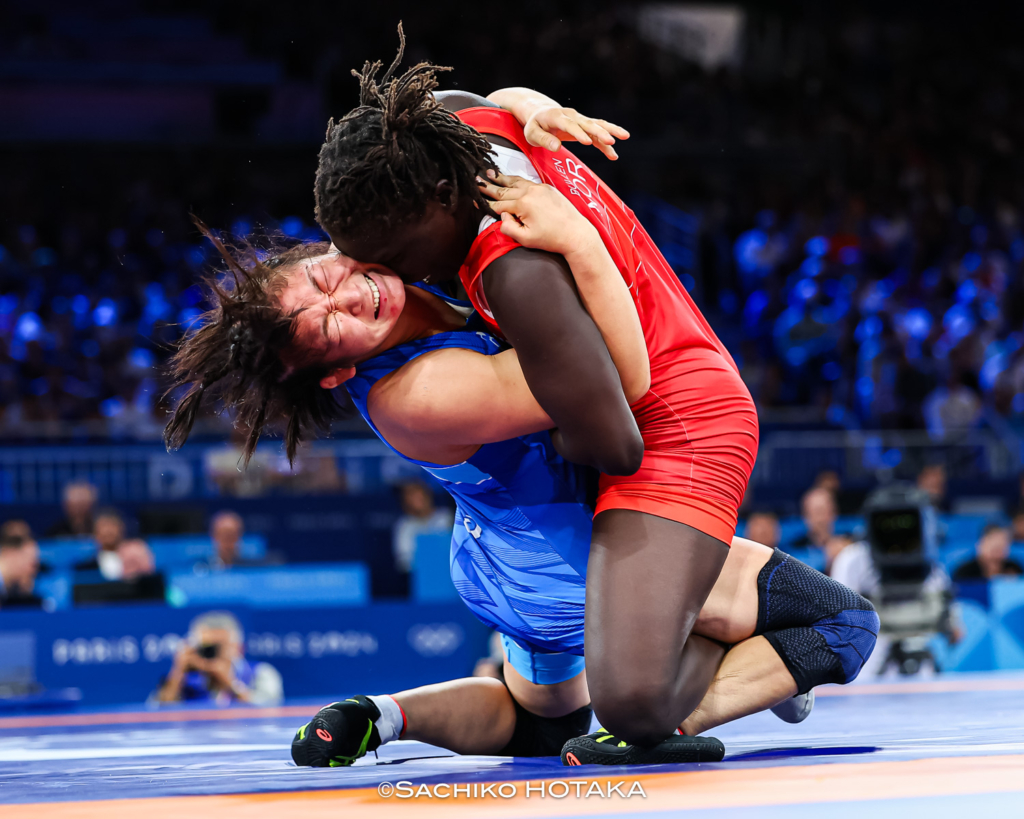
Sakura MOTOKI pulls off the miracle move of the tournament, going into a bridge to flip Grace BULLEN (NOR) onto her back for a fall after trailing 7-2 in their women’s 63kg semifinal. (photo by Sachiko HOTAKA)
Both Tokyo champion Yui SUSAKI at 50kg and Nonoka OZAKI at 68kg won bronze medals, but it was small consolation after each suffered stunning last-second losses in earlier matches.
Susaki was dealt her first-ever international loss in 95 matches when 2018 Asian Games champion Vinesh PHOGAT (IND) scored a takedown in the dying seconds of their first-round match for 3-2 win. Ozaki fell in a likewise manner to 2021 world champion Meerim ZHUMANAZAROVA (KGZ), losing 8-6 in the quarterfinals at 68kg.
Both shook off the devastating defeats to make it to the bronze-medal matches, where they posted one-sided wins to ensure they would not leave Paris empty-handed.
Higuchi gains elusive Olympic freestyle gold
In freestyle, eight years after having to settle for a silver medal in Rio, Rei HIGUCHI captured an elusive Olympic gold with an impressive performance at 57kg, capped by a 4-2 victory in the final over Spencer LEE (USA).
Higuchi’s bid to make up for the disappointment of Rio was interrupted when he missed the Tokyo Olympics after infamously failing to make weight at the Asian Qualifier. But he put that all in the past in Paris with a victory by forfeit and two by technical superiority to make the final.
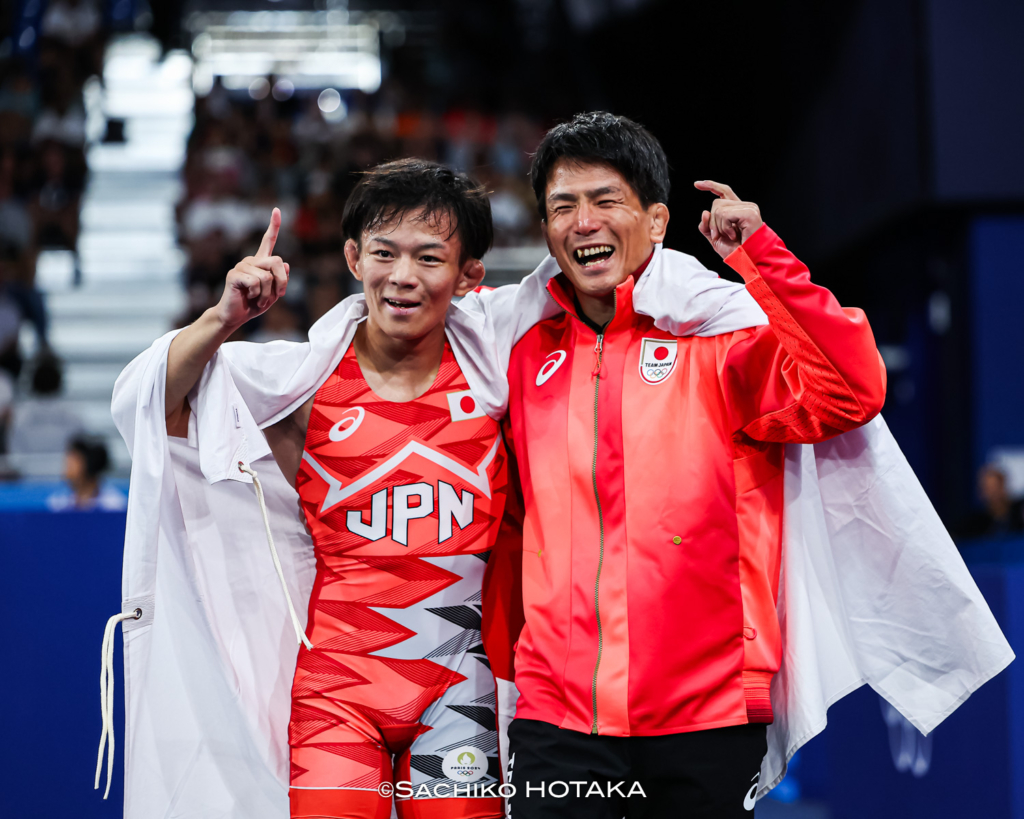
Rei HIGUCHI, left, celebrates with coach Kenichi YUMOTO after winning the freestyle 57kg gold that eluded him eight years ago in Rio. (photo by Sachiko HOTAKA)
Unheralded Kotaro KIYOOKA picked up the other freestyle gold for Japan and kept the Olympic 65kg title in Japanese hands.
Kiyooka knocked off Asian Games champion Tulga TUMUR OCHIR (MGL) 5-1 in the semifinals, then defeated 2022 world champion Rahman AMOUZAD (IRI) 10-3 in the final.
Takuto OTOGURO had won the 65kg gold at the Tokyo Olympics, but lost out in the qualifying process for Paris to Kiyooka, who had appeared at the World U23 Championships but had never competed on the senior global level.
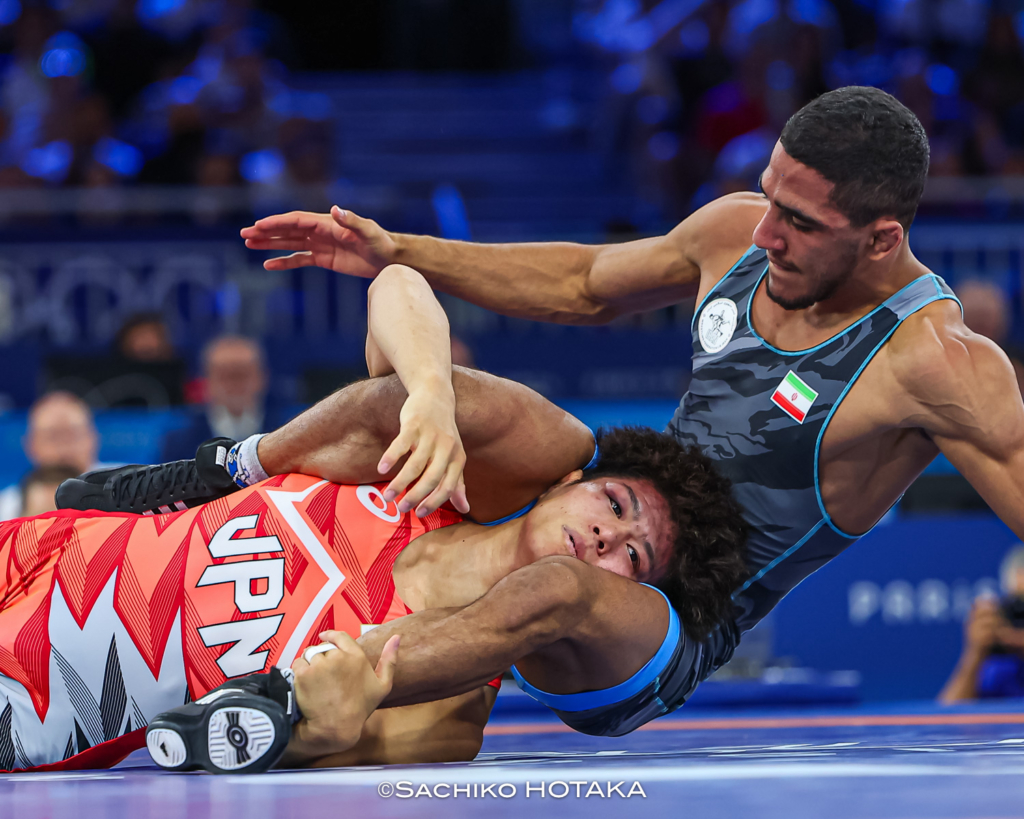
Kotaro KIYOOKA, left, scores with a unique high-leg roll in the 65kg final against 2022 world champion Rahman AMOUZAD (IRI). (photo by Sachiko HOTAKA)
At 74kg, Daichi TAKATANI took home the silver in his Olympic debut. Takatani chalked up an action-packed 20-12 victory in the semifinals over 2022 world champion Kyle DAKE (USA) in what many regard as the match of the tournament, but lost by fall in the final to Razambek JAMALOV (UZB).
Meanwhile, Gaku AKAZAWA, who switched nationality to Samoa and earned a ticket to Paris in the Africa-Oceania Qualifier, lost in the first round and was not pulled into the repechage.
Here are the results of Japan wrestlers:
Greco-Roman
60kg Kenichiro FUMITA 1st
67kg Kyotaro SOGABE 14th
77kg Nao KUSAKA 1st
Women
50kg Yui SUSAKI 3rd
53kg Akari FUJINAMI 1st
57kg Tsugumi SAKURAI 1st
62kg Sakura MOTOKI 1st
68kg Nonoka OZAKI 3rd
76kg Yuka KAGAMI 1st
Freestyle
57kg Rei HIGUCHI 1st
65kg Kotaro KIYOOKA 1st
74kg Daichi TAKATANI 2nd
84kg Hayato ISHIGURO 7th
Japan claims just 1 gold at world U17
The World U17 Championships were held Aug. 19-25 in Amman, Jordan. Yu KATSUME‘s victory at girls’ 46kg providing the lone gold medal for Japan over the three styles in a less-than-inspiring performance.
Katsume, the Asian U15 champion the past two years, won all four of her matches by technical superiority in a combined time of 226 seconds (an average of 57 seconds per match), while outscoring her opponents 43-2.
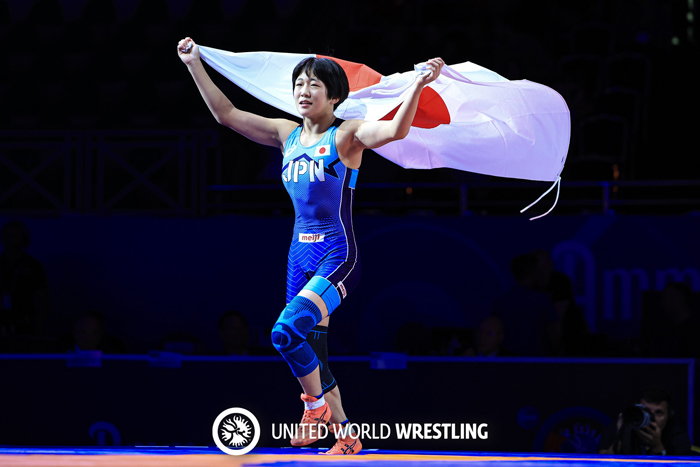
Yu KATSUME, a two-time Asian U15 champion, celebrates her victory at the World U17 Championships in the girls’ 46kg division. (photo from UWW website)
Including Katsume, Japan had finalists in five of the girls’ weight classes, but the other four all went down to defeat. Japan also won one bronze medal. India, with five champions, won the team title to knock Japan off the throne it had occupied since 2013.
The freestyle squad won three bronze medals. While that kept alive a streak of winning at least one medal in every tournament since the world U17 (formerly cadet) was restarted in 2011, it was only good enough for a seventh-place finish with 57 points.
In Greco-Roman, Japan, which had two champions last year, could manage just two match wins across the 10 weight classes. With no medals, the squad finished 16th with just 12 points.
–Translation by Ken Marantz





